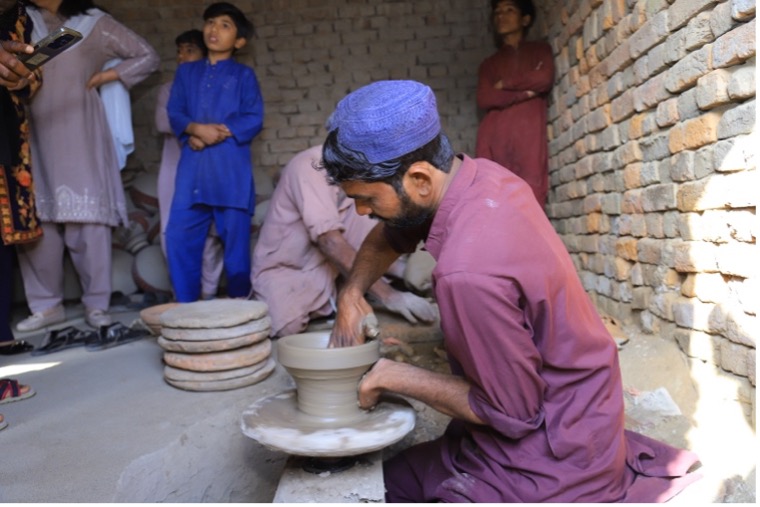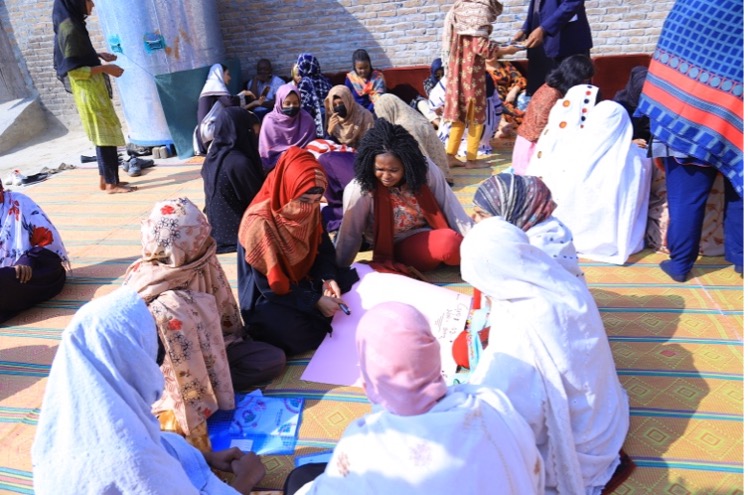By Malizani Edward Mdala
The crisp morning air in the Bhakkar region buzzed with anticipation as delegates from Malawi, Mozambique, Sri Lanka, and Bangladesh—part of the Commonwealth of Learning’s Empowering Women and Girls project—gathered for the third day of their study tour. Hosted by Bedari, a leading organization championing women's empowerment in the region, the study tour aimed to spotlight initiatives transforming the lives of women and girls and build global collaboration.
The first stop of the day was in Sadiq Akbar at Muhammad Iqbal's Clay Arts Center. Bedari's district coordinator, Rabia, and master trainer Riaz Haji introduced the art of clay molding as a pathway to financial independence. Soon, women and girls from the community would be trained in this craft, turning their creativity into sustainable businesses. The delegates admired the intricate designs, recognizing the immense potential for economic empowerment.

The next stop was 22-TDA, where Shahida Parveen, a local focal person, and Sonia, a Bedari facilitator, demonstrated how Local Support Groups (LSGs) mobilize communities to prioritize girls' education. Addressing challenges such as transportation and safety, the discussion highlighted new grassroots solutions that ensure more girls can attend school, breaking down common barriers for women and girls.
The delegates then visited the District Commissioner’s office and the Police Officer-in-Charge in Bhakkar. Commending Bedari’s efforts, the District Commissioner underscored the urgent need to bridge the gender employment gap and encouraged the expansion of skill-building initiatives for women and girls. The Police Officer-in-Charge shared that over 20,000 children in Bhakkar alone were unable to attend school due to domestic violence and other societal challenges, emphasizing the importance of education.
Bedari’s Executive Director, Ms. Anbreen Ajaib, shared the organization’s holistic approach, outlining plans for digital literacy training to enable online business ventures. She also highlighted an ongoing collaboration with the police to provide women with driving lessons—an essential step toward independence. “The support we receive from both the District Commissioner and the police is invaluable in ensuring the smooth implementation of our programs,” she shared.
Ms. Frances Ferreira, Senior Advisor for Empowering Women and Girls (EWG), emphasized the importance of collaboration in achieving project success. “One organization alone cannot meet all the community’s needs; collaboration is the way forward,” she concluded, applauding the District Commissioner and Police Officer-in-Charge for their unwavering support.
In Baroka, the group observed two impactful awareness sessions. The first, led by Sobia and facilitated by police focal person Asmat Ullah, focused on women’s human rights, gender equality, and Sexual and Reproductive Health and Rights (SRHR). Policewoman Zubeida detailed the domestic violence redressal mechanisms available at the Victim Support Unit (VSU). The second session, led by Nigar from Bhakkar Health Unit, addressed public healthcare services and climate change, encouraging women to access available services and embrace their rights with dignity and pride.

In the afternoon, the delegation visited the embroidery center in Zorani, 17-TDA, established by Bedari in collaboration with IFAD, IRM, and SPPAP. Here, girls undergo three-month embroidery training, earning government-recognized certificates upon completion. These certificates open doors to further education and entrepreneurship, fostering self-reliance and economic independence. Bedari’s comprehensive training programs—covering financial literacy, human rights, SRHR, and climate change—equip these young women with the confidence to navigate a competitive world.
The day concluded with a visit to safe learning centers that accommodate girls from Majhoka and Moher-Awala villages. Set up by Bedari, these centers provide education from grades 6 to 10 for students who cannot afford traditional schooling. Taught by Farwa Sidra, a community role model, the students spoke passionately about their dreams of becoming doctors, teachers, pilots, and entrepreneurs.
As the sun dipped below the horizon, the delegates reflected on the resilience and determination they had witnessed. The Commonwealth of Learning’s partnership with Bedari was more than just a project—it was a movement transforming lives. By empowering women and girls to dream, achieve, and inspire, this initiative reaffirmed a universal truth: when women and girls are empowered, entire communities flourish, and the world prospers.